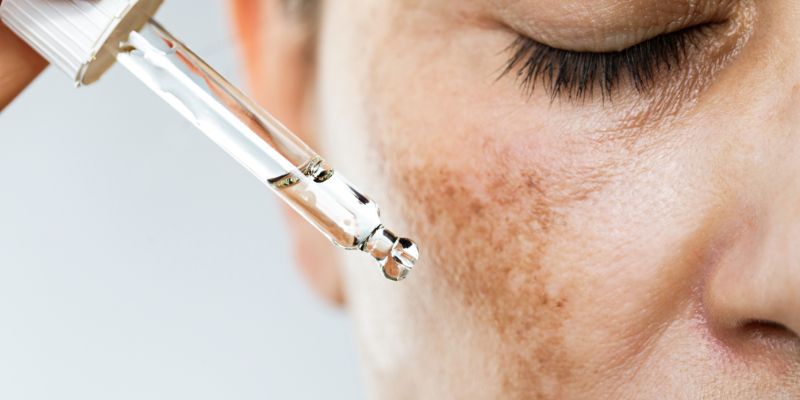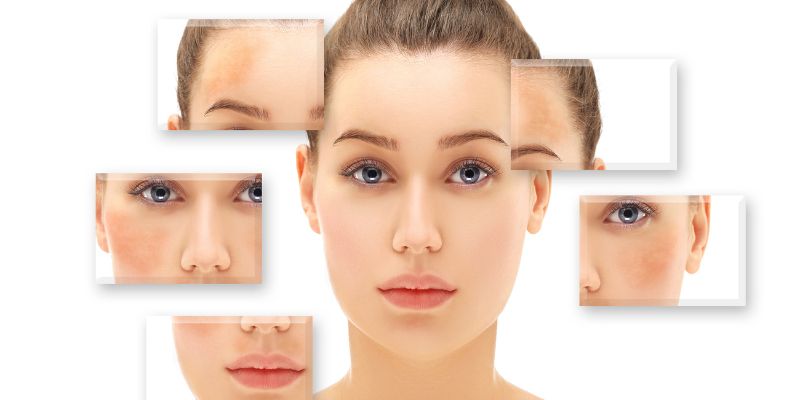The good news? Dark spots may be quickly removed, and a more even, glowing complexion can be attained with the correct skincare regimen and products. Let's discover the top skincare products, treatments, and advice in this guide to help you eliminate hyperpigmentation quickly and efficiently!
The good news? Dark spots may be quickly removed, and a more even, glowing complexion can be attained with the correct skincare regimen and products. Let's discover the top skincare products, treatments, and advice in this guide to help you eliminate hyperpigmentation quickly and efficiently!

What Causes Dark Spots & Hyperpigmentation?
Dark spots result from excessive melanin secretion. Many factors cause this excess production.
Sun Exposure And Hyperpigmentation
One of the leading causes of black spots is sun exposure. Sunspots, or age spots, are caused by UV radiation stimulating melanin synthesis. Without sunscreen, a little sun exposure might worsen pigmentation years later.
Post Acne Scars
If you've ever had acne, you might have noticed that a dark spot remains behind even after the acne disappears. This is called post-inflammatory hyperpigmentation (PIH). When the skin heals after acne, excess melanin may be produced in that region, resulting in a dark spot.
Hormonal Changes And Melasma
Many factors result in dark patches or spots on the skin. One type of pigmentation developed as a result of pregnancy or pregnancy pills is melasma, which produces dark spots on some areas of the face.
Ageing And Skin Discoloration
With increasing age, prolonged exposure to environmental factors such as sunlight results in age spots. The hands, feet, and face are the areas exposed to the skin that develop dark patches.
Skin Injuries Patches
Some spots and pigmentation are also the result of skin injuries, such as accidents, burns, scratches, and irritations. Inflammation of the skin produces more melanin, leading to darkening in the area involved.

Now, we have discussed some reasons for dark spots and pigmentations. Let's move towards some treatments.
1. Use Vitamin C For Skin Brightening
According to skin specialists, vitamin C is one of the best antioxidants since it may lighten dark spots and make skin more radiant. Vitamin C reduces the production of melanin and, as a result, lightens dark spots and evens skin tone. Since more collagen is produced with Vitamin C, the result is healthier, smoother skin.
How To Use Vitamin C For Dark Spots
After cleansing in the morning, you'll want to apply your Vitamin C serum to your routine. The most stable form of vitamin C is L-ascorbic acid, which is found in vitamin C serums. Since vitamin C helps with UV protection, apply sunscreen afterwards for full benefits.
2. Try Niacinamide For Even Skin Tone
Niacinamide, or vitamin B3, is another miraculous component in skincare products that reduces hyperpigmentation. It improves skin barrier function, lowers redness, and controls melanin synthesis.
How To Use Niacinamide
Niacinamide can be applied throughout the day or at night. It is a good combination of retinol, hyaluronic acid, and vitamin C. Regular application will eventually lighten dark spots and enhance skin texture.
3. Use Retinol To Speed Up Skin Renewal
Retinol, a vitamin A derivative that provides an additional boost, may reduce dark spots. It renews cell turnover, exfoliating old pigmented skin cells to reveal healthy new skin. It promotes collagen synthesis, rendering the skin firmer with an even tone and smooth surface.
How To Use Retinol For Dark Spots
Start with a low concentration, between 0.3% and 0.5%, to lessen irritation. Apply it at night because retinol makes the skin more sensitive to sunlight. While applying retinol, it is essential to use sunscreen every day because it can even reduce hyperpigmentation. Hydrating ingredients with retinol, like hyaluronic acid and ceramides, will help counteract dryness and irritation.

4. Exfoliate With Ahas & Bhas
Exfoliation is essential for fading dark spots. It helps remove dead cells and allows healthy new skin to form in their place. Alpha hydroxy acids (AHAs) and beta hydroxy acids (BHAs) are best suited to reduce hyperpigmentation and improve skin texture.
Types Of Exfoliants For Hyperpigmentation
1. Glycolic Acid (AHA): An acid that penetrates deeply to brighten the skin and produce an even tone.
2. Lactic Acid (AHA) is a mild exfoliant that helps shed dead skin from dull surfaces.
3. Salicylic Acid (BHA): This exfoliant favours breakout-prone skin by penetrating pores to prevent acne from surfacing and fading pricking scars.
How To Use Ahas & Bhas
Exfoliating treatments should be used two to three times a week at night. Avoid using acid treatments on the same night as retinol application due to irritant cumulative effects. Give your skin room to breathe and gradually adjust.
5. Use Sunscreen Every Single Day
If you're trying to lighten your dark spots but aren't putting on sunblock, you're wasting your time! Sun exposure triggers melanin formation and aggravation of hyperpigmentation. Broad-spectrum sunscreens with SPF 30+ are a must to avoid creating newer dark spots.
How To Use Sunscreen For Hyperpigmentation
Please wear it every morning, in any weather, unless you're lying on the couch. Reapply every two hours when you're outside. Mineral sunscreens with zinc or titanium dioxide are best for sensitive skin types.
6. Try Professional Treatments For Faster Results
Professional treatments always yield faster results when combined with an appropriate skincare routine. They follow a dermatologist's recommendation on the best action for a particular skin type.
Best Professional Treatments For Hyperpigmentation
1. Chemical Peels: These treatments use AHAs to exfoliate the skin profoundly and lighten dark spots.
2. Laser Therapy: This targets dark spots using high precision to break down the excess pigment.
3. Microdermabrasion: The gentle removal of the top skin layer helps further even the skin tone.
Professional treatments always give faster results when enhanced with a proper skincare regimen. They take the advice of a dermatologist regarding the best option available for a specific skin type.
7. Natural Remedies For Dark Spots
Natural remedies also exist for those who want long-term benefits. Fading the spots or pigmentation takes more time than other treatments.
Natural Remedies
1. Aloe Vera: This soothing agent lightens residual pigmentation and helps repair skin.
2. Turmeric Paste: This contains curcumin, which brightens the skin by reducing inflammation.
3. Lemon Juice (be very careful): It has natural Vitamin C but is too strong for sensitive skin.
While these help, they are not as fast as medical-grade skin care.
Consistency Is Key!
Dark spots do not disappear overnight, but they can fade quickly within weeks with the right ingredients, treatments, and consistency. The key lies in exfoliating, using brightening serums, applying sunscreen daily, and being patient.
Are you ready to transform your spots into clear, even, and glowing skin? Begin now with Vitamin C, niacinamide, retinol, and SPF use, and watch as your dark spots slowly vanish before your eyes!
- Share this article:
-
![Hearing Loss Solutions in Senior Living: A Step-by-Step Guide]() Health & Medical Treatment
Health & Medical Treatment - Hearing Loss Solutions in Senior Living: A Step-by-Step GuideHaving worked with seniors for years, I've witnessed how hearing loss quietly sucks the joy out of life. Picture your favourite song slowly fading into silence or the laughter of your grandchild growing fainter. It may feel isolating—but it doesn't have to be. Let's walk through this together and discover how seniors and their families can confront hearing loss with real-world, life-altering solutions.
-
![How To Overcome Language Barriers While Traveling]() Travel
Travel - How To Overcome Language Barriers While TravelingHave you ever struggled to order food or ask for directions because of a language barrier? Language differences can hinder your travel experience but shouldn't stop you from exploring. Luckily, there are apps and methods to help you communicate effectively and enjoy your journey. Let’s dive into them!








